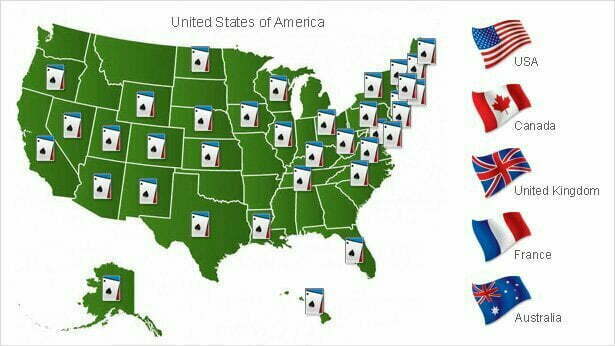Why Is Internet Gambling Illegal In Some States
Since the 18th century, the state has brought its gambling legislation into the modern era. Casino gambling, sports betting and poker are all illegal in both offline and online forms. Below is a timeline of some of the most significant gambling legislation in the state’s history. That means in most states, placing a bet online will be illegal, or placing a bet with an overseas sports book (like Ladbrokes) will be illegal. And even if you are in a state which allows online gambling, the site you want to gamble with must be authorized for it to be legal to bet with them–and states allowing sports betting are not going. What IS illegal is for a person to accept or process wagers or financial transactions for an unlawful internet gambling site. In 2011, of course, headlines were made when the United States Justice Department went after famous poker players like Chris “Jesus” Ferguson, and Howard Lederer.
Gambling Law: An Overview
Gambling, though widespread in the United States, is subject to legislation at both the state and federal level that bans it from certain areas, limits the means and types of gambling, and otherwise regulates the activity.
Congress has used its power under the Commerce Clause to regulate interstate gambling, international gambling, and relations between the United States and Native American territories. For example, it has passed laws prohibiting the unauthorized transportation of lottery tickets between states, outlawing sports betting with certain exceptions, and regulating the extent to which gambling may exist on Native American land.
Each state determines what kind of gambling it allows within its borders, where the gambling can be located, and who may gamble. Each state has enacted different laws pertaining to these topics. The states also have differing legal gambling ages, with some states requiring the same minimum age for all types of gambling, while for others, it depends on the activity. For example, in New Jersey, an 18-year-old can buy a lottery ticket or bet on a horse race, but cannot enter a casino until age 21. Presumably, the age 21 restriction is due to the sale of alcohol in that location.
A standard strategy for avoiding laws that prohibit, constrain, or aggressively tax gambling is to locate the activity just outside the jurisdiction that enforces them, in a more 'gambling friendly' legal environment. Gambling establishments often exist near state borders and on ships that cruise outside territorial waters. Gambling activity has also exploded in recent years in Native American territory. Internet-based gambling takes this strategy and extends it to a new level of penetration, for it threatens to bring gambling directly into homes and businesses in localities where a physical gambling establishment could not conduct the same activity.
Internet Gambling
Federal Regulation

In the 1990s, when the World Wide Web was growing rapidly in popularity, online gambling appeared to represent an end-run around government control and prohibition. A site operator needed only to establish the business in a friendly offshore jurisdiction such as the Bahamas and begin taking bets. Anyone with access to a web browser could find the site and place wagers by credit card. Confronted with this blatant challenge to American policies, the Department of Justice and Congress explored the applicability of current law and the desirability of new regulation for online gambling.
In exploring whether an offshore Internet gambling business taking bets from Americans violated federal law, attention was focused on the Wire Act, 18 U.S.C. § 1084 (2000). The operator of a wagering business is at risk of being fined and imprisoned under the Wire Act if the operator knowingly uses a 'wire communication facility' to transmit information related to wagering on 'any sporting event or contest.' 18 U.S.C. § 1084(a). An exception exists if that act is legal in both the source and destination locations of the transmission. § 1084(b). The Wire Act’s definition of “wire communication facility” appears to embrace the nation's entire telecommunications infrastructure, and therefore probably applies to online gambling. See § 1081.

The Department of Justice maintains that, under the Wire Act, all Internet gambling by bettors in the United States is illegal. U.S. House of Representatives Committee on the Judiciary Hearing on Establishing Consistent Enforcement Policies in the Context of Online Wagers, 110th Cong., Nov. 14, 2007 (testimony of Catherine Hanaway, U.S. Attorney (E.D. Mo.), Dept. of Justice). The Fifth Circuit disagreed, ruling that the Wire Act applies only to sports betting, not other types of gambling. In re MasterCard Int’l Inc., 313 F.3d 257 (5th Cir. 2002).
In 2006, Congress passed the Unlawful Internet Gambling Enforcement Act, which made it illegal for wagering businesses to knowingly accept payment in connection with unlawful Internet gambling (though it does not itself make Internet gambling illegal). 109 Pub. L. 109-347, Title VIII (Oct. 13, 2006) (codified at 31 U.S.C. §§ 5301, 5361–67). It also authorizes the Federal Reserve System to create regulations that prohibit financial transaction providers (banks, credit card companies, etc.) from accepting those payments. See 31 U.S.C. § 5363(4). This Act, along with threats of prosecution under the Wire Act from the Department of Justice, has caused several Internet gambling businesses to withdraw from the U.S. market.
In response, House Representatives introduced multiple bills in 2007 to soften federal Internet gambling law. If passed, the Internet Gambling Regulation and Enforcement Act and the Internet Gambling Regulation and Tax Enforcement Act would license, regulate, and tax Internet gambling businesses rather than prohibit them from taking bets from the United States. Alternatively, the Skill Game Protection Act would clarify the Wire Act to exempt certain games such as poker and chess.
State Regulation
In addition to federal measures, some states have enacted legislation to prohibit some types of Internet gambling. In 2006, Washington State amended its Code to make knowingly transmitting or receiving gambling information over the Internet a felony. See Wash. Rev. Code § 9.46.240 (2006). Other states with similar prohibitions have made it a misdemeanor instead. See e.g., 720 ILCS 5/28-1 (2007).
Why Is Internet Gambling Illegal In Some States Going
States have not been particularly active in enforcing these laws, possibly due to a conflict with the dormant Commerce Clause doctrine. That doctrine theorizes that state law applying to commerce outside the state’s borders is unconstitutional because that power lies with federal, not state, government. In particular, federal preemption has obstructed states’ attempts to regulate gambling activity on Indian reservations within state borders. See Missouri ex rel. Nixon v. Coeur D’Alene Tribe, 164 F.3d 1102 (8th Cir. 1999). The federal Indian Gaming Regulatory Act, 25 U.S.C. § 29 (2000), governs gambling activity on Indian reservations, but the extent to which it and other federal gambling laws preempt state action in the Internet arena is uncertain.
menu of sources
Federal Material
U.S. Constitution and Federal Statutes
- U.S. Code: Title 15, Chapter 24: Transportation of Gambling Devices
- U.S. Code: Title 15, Chapter 57, Interstate Horseracing
- U.S. Code: Title 18, Chapter 50: Gambling
- U.S. Code: Title 18, Chapter 61: Lotteries
- 18 U.S.C. §1953 (Interstate Transportation of Wagering Paraphernalia Act)
- 18 U.S.C. §1955 (Illegal Gambling Business Act of 1970)
- 25 U.S.C. §§2701-2721 (Indian Gaming Regulatory Act)
- U.S. Code: Title 28, Chapter 178: Professional and Amateur Sports Protection
- Code of Federal Regulations: Title 25, Chapter 3: National Indian Gaming Commission, Department of the Interior
- Proposed Internet Gambling Prohibition Act of 1997 (not passed)
Federal Judicial Decisions
- Greater New Orleans Broadcasting Association, Inc. v. United States, 527 U.S. 173 (1999)
- Ratzlaf v. United States, 510 U.S. 135 (1994)
- Chickasaw Nation v. United States, 534 U.S. 84 (1999)
State Material
Other References
- '14 Charged in Internet Betting' (Washington Post, March 5, 1998)
- wex
If you’re an experienced gambler, you know how difficult it is to find a reliable online casino that serves US citizens. The same holds true for both sites that use traditional currencies, as well as those that use bitcoin. In most of the United States, the legal framework does not consider it illegal to bet cryptocurrencies in online casinos. However, we need to take a look at the most critical law in US online gambling to understand whether bitcoin gambling is legal in the country or not.
Why Is Internet Gambling Illegal In Some States Still
The law we’re talking about is called the Unlawful Internet Gambling Enforcement Act (UIGEA), and it was signed in October 2006. This Act stipulates that credit card companies and banking facilities do not have the authority to execute transactions related to online gambling. In simpler terms, online casinos had been able to use the US banking system for their purposes until 2006, but UIGEA has made that illegal.
Some of the biggest global operators were forced to withdraw from the US market. However, since the Act only mentions the traditional banking system and doesn’t say anything about cryptocurrency, some online casino operators decided to switch their focus to this payment option. This loophole enabled the casinos to technically remain within the boundaries of the law.
The Confusing Laws Regarding Online Gambling
Consequently, there is no federal legislation that makes online gambling illegal. Current laws explicitly prohibit casinos from accepting bets on US soil, but no laws exist about placing bets from the territory of the United States. This is precisely why all bitcoin casinos are based outside of the country, which allows them to accept bets while circumventing US regulations. In terms of practicality, Bitcoin’s legal status dramatically depends on each specific state. There are three possible options: illegal, legal, and not unlawful.
Residents of Nevada, New Jersey, and Delaware are allowed to use Bitcoin in any gambling activities. Special geo-targeting software must be used by the casinos to ensure that the customers are indeed physically located in one of the three states. This software is easily circumvented by VPNs, which a lot of gamblers in the States use to hide their IP address.
Why Is Internet Gambling Illegal In Some States In America
Laws in the Individual States
Why Is Internet Gambling Illegal In Some States Allow
Washington is the only US state that expressly prohibits online gambling. Offshore gambling sites may not be used by state residents, meaning that they are not allowed to register there nor place bets regardless of the currency they intend to use. Online casinos are required to turn away players with IP addresses coming from the Evergreen State. However, since the state doesn’t have the necessary human resources to keep track of every potential player, Washingtonians still gamble thanks to VPNs.
Unlike Washington, the majority of US states neither forbid nor explicitly allow online gambling activities for their citizens. Players, therefore, must abide by federal laws, particularly UIGEA, which we mentioned earlier. That said, there have been no charges against players since the Act came into effect.
This legislation primarily targets online exchanges and banks that process payments related to online gambling. However, it is always a good idea to remain vigilant and use a VPN if you plan to gamble online. Also, as should be the case with any online activity you take part in, leave as little personal information as possible.
Gambling on Bitcoin games is not deemed unlawful in the majority of states. However, some states still consider this topic controversial, and disputes over it arise daily. It is uncertain whether this discussion will lead to further liberalization or prohibition. Keep this in mind when considering Bitcoin gambling, since this advice may not stay relevant in the future. Before registering in any online casino, make sure that gambling is still legal in your area.